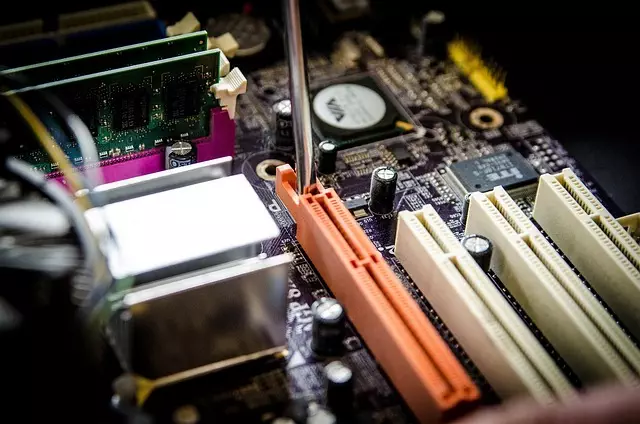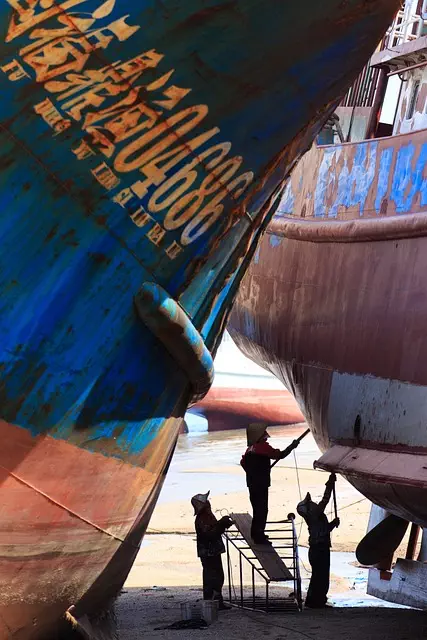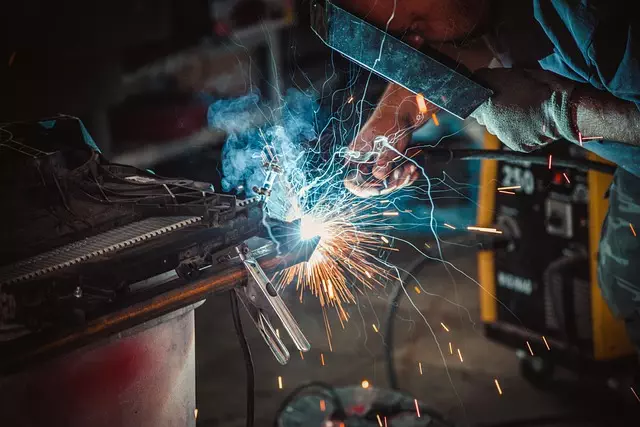Concrete anchor bolt installation is a crucial skill in foundation repair, securing structures to concrete slabs and walls for stability. With various bolt types and anchoring techniques, professionals choose tools and methods based on project needs. Site preparation ensures integrity through crack inspection and surface leveling. Selecting the right bolt size and type according to load requirements, material, moisture levels, and expected movements is vital. A step-by-step guide outlines critical procedures: structural inspection, anchor bolt determination, drilling pilot holes, bolting placement, testing tension, and individual fastening strength checks. Proper installation ensures structural integrity and long-term stability for foundation repair with warranties. Concrete anchor bolts are versatile, useful in various applications like reinforcing walls, repairing cracks, outdoor structures, sign posts, equipment support, and machinery mounting. Regular maintenance is key to protecting investments and ensuring the longevity of Foundation Repair with Warranty.
Concrete anchor bolt installation is a critical component of foundation repair, offering lasting support for structures. This comprehensive guide delves into the essentials of concrete anchor bolt placement, from understanding their purpose in foundation repairs to selecting the right bolts and efficient installation techniques. We explore why these bolts are a game-changer in various applications, ensuring structural integrity with a focus on long-term stability and a solid investment, backed by warranty and proper maintenance practices.
Understanding Concrete Anchor Bolt Installation: A Foundation Repair Essential

Concrete anchor bolt installation is a critical process in foundation repair, offering a robust solution for securing structures to concrete slabs or walls. It’s an essential skill for any professional in the foundation repair industry, ensuring buildings remain stable and structurally sound. These bolts provide anchorage, allowing for the attachment of heavy equipment, fixtures, or structural elements, which is particularly important when dealing with older constructions or repairs requiring significant reinforcement.
Understanding the mechanics behind concrete anchor bolt installation is key to achieving effective Foundation Repair with Warranty. The process involves drilling into the concrete and strategically placing bolts that bear the weight and stress, preventing further damage or shifting. With various bolt types and anchoring techniques available, professionals must select the right tools and methods for each project, ensuring long-lasting results.
Why Choose Concrete Anchor Bolts for Foundation Support?

Concrete anchor bolts offer a robust and reliable solution for foundation support, making them an excellent choice for any structural project. One of the primary reasons to opt for concrete anchor bolts is their exceptional strength and durability. These bolts are designed to withstand extreme forces, ensuring that structures remain stable and secure over time. This is especially beneficial in regions prone to seismic activity or high wind loads, where a solid foundation is paramount.
Additionally, concrete anchor bolts provide a cost-effective alternative to traditional foundation repair methods. With their long-lasting performance and the option of a foundation repair with warranty, homeowners and contractors can benefit from a reliable and efficient system. This ensures peace of mind, knowing that the structural integrity of buildings is enhanced without compromising on quality or guarantees.
Preparing the Site: Ensuring a Solid Foundation for Bolts

A crucial step in any construction or renovation project involving concrete structures is preparing the site, especially when installing anchor bolts. Before drilling and inserting the bolts, a thorough inspection of the surface area should be conducted to identify potential issues that could compromise the foundation’s integrity. This includes checking for cracks, uneven surfaces, or existing damage that might require repair, as these elements can directly impact the bolt’s long-term performance.
Foundation repair with warranty is a key consideration here. By addressing any site preparation needs, including repairing or leveling concrete, you ensure a solid base for the anchor bolts. This step is vital to prevent future instability and potential structural damage. Properly prepared surfaces guarantee that the anchor bolts will be securely fastened, providing a reliable and durable solution for any construction project.
Selecting the Right Anchor Bolt Size and Type

When it comes to concrete anchor bolt installation, especially for foundation repair projects that offer a warranty, selecting the right size and type is paramount. The suitable anchor bolt should be chosen based on the specific application’s load requirements, the type of materials being joined, and environmental factors such as moisture levels and expected structural movements.
For instance, a larger diameter bolt may be necessary for heavy-duty applications or when connecting concrete to materials like steel beams or columns. Conversely, smaller bolts could suffice for lighter structures or temporary support. Additionally, different types of anchor bolts, including mechanical, chemical, and hybrid anchors, cater to various installation scenarios. Mechanical anchors rely on friction and the deforming of the bolt for strength, while chemical anchors bond with the concrete through a curing process. Selecting the appropriate anchor type ensures structural integrity and supports the longevity of any Foundation Repair with Warranty endeavor.
Step-by-Step Guide to Efficient Anchor Bolt Placement

To ensure efficient anchor bolt placement for foundation repair with warranty, follow this step-by-step guide. Begin by inspecting the structure and identifying the specific areas requiring reinforcement. Next, determine the appropriate type and size of anchor bolts needed based on structural calculations and local building codes. Mark the locations where the bolts will be inserted using a level and square to ensure accurate alignment.
Drill pilot holes at the marked locations, taking care not to over-drill to avoid bolt damage. Insert the anchor bolts into the pilot holes, ensuring they are fully seated and secured with appropriate threads. Apply the recommended torque specifications for each bolt to guarantee strong holding power. Once installed, test the bolting system by applying tension to verify its integrity. This meticulous approach ensures robust foundation repair with a warranty-backed outcome.
Testing and Ensuring Proper Fastening: Techniques and Tools

After preparing the concrete surface for anchor bolt installation, it’s crucial to test and ensure proper fastening. This involves using specialized tools like tension gauges to measure the pull strength of the bolts, confirming they meet the required specifications. By checking each bolt individually, you can identify any weak points or loose connections, ensuring the structural integrity of the foundation repair with warranty in place.
For accurate results, follow industry standards and guidelines when conducting these tests. Proper fastening not only secures the bolts but also guarantees long-term stability for the entire foundation system. Using advanced tools and adhering to best practices ensures that the concrete anchor bolt installation stands the test of time, providing a robust solution for any Foundation Repair with Warranty.
Applications of Concrete Anchor Bolts in Various Structures

Concrete anchor bolts are versatile fasteners that find applications in a wide range of structures, from residential buildings to commercial constructions and even infrastructure projects. These bolts play a critical role in securing various components to concrete surfaces, ensuring structural integrity and stability. In the realm of foundation repair, for instance, concrete anchor bolts with warranties offer reliable solutions for bolstering walls, repairing cracks, and reinforcing foundations, thereby preventing further damage and ensuring longevity.
In addition to foundation repair, these bolts are indispensable in erecting sign posts, supporting equipment, and installing permanent fixtures like handrails, fences, and machinery mounts. Their ability to withstand immense loads and resist corrosion makes them suitable for outdoor applications, where exposure to weather conditions is a concern. Concrete anchor bolts provide a durable and cost-effective method of fastening, contributing to the overall strength and reliability of various structures.
Warranty and Maintenance: Protecing Your Foundation Repair Investment

When it comes to concrete anchor bolt installation, one of the most crucial aspects to consider is the warranty and ongoing maintenance. A solid foundation repair investment should come with a comprehensive warranty that protects against any structural issues or failures resulting from the bolt installation. This warranty acts as a safety net, ensuring peace of mind for property owners who have undertaken this important process.
Regular maintenance plays a significant role in extending the lifespan of your foundation repair. It’s essential to follow the recommended maintenance schedule provided by professionals who handled the installation. Proper care includes inspecting the bolts periodically, tightening them as needed, and addressing any signs of corrosion or damage promptly. By prioritizing warranty and maintenance, you safeguard your investment and ensure the longevity of your foundation repair with concrete anchor bolts.
